TasWeekend: It’s game on for state’s football leader
With an uncompromising sense of self, AFL Tasmania chief executive Trisha Squires is determined to lead state footy for years to come.
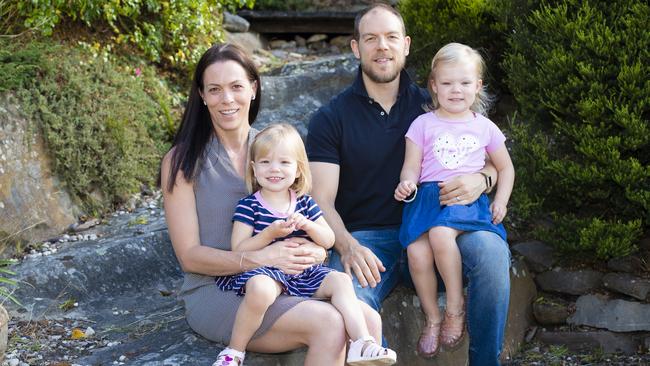
AFL
Don't miss out on the headlines from AFL. Followed categories will be added to My News.
WHY is a woman running football? Some people ask Trisha Squires the question directly and others ask it behind her back.
Some even say AFL Tasmania’s first female chief executive was given the job because people feel sorry for her after an earlier, life-changing tragedy.
Squires is having none of it. She is confident most footy lovers don’t give a hoot about her gender and just want whoever’s in charge to arrest the code’s decline in Tasmania and Save Our Footy, as the Mercury slugged our 2018 campaign.
“There’s been a few times I’ve been questioned in person about whether I know enough about football, and I certainly know that a number of my staff have been asked why a sheila is running football,” she says. ”And I’ve had instances where a few people have applied for jobs here and said in the interviews ‘I don’t mind working for a woman’, and I’m, like, ‘why would that come up?’ So I’ve certainly dealt with it. I don’t see it as a personal attack, but I also know I have enough strength to let it not bother me.”
The 37-year-old Melburnian, who moved to the state three years ago, believes she is the right person for the job. She believes it with the conviction of someone who was exposed from teen years to self-empowerment strategies and whose mentor, late Melbourne champion Jim Stynes, bolstered her self-belief over many years. Today she is a picture of success with an impressive CV and a beautiful young family, but it hasn’t been a charmed life. Once she was the public face of a devastating tragedy. Squires’ first husband, promising AFL defender Troy Broadbridge, died on their 2004 honeymoon in Thailand when they were hit by the Boxing Day tsunami.
Though she believes she is a good fit for the role, a year in Squires is yet to entirely convince the local footy fraternity, a burnt and cynical bloc that does not trust its own governing body to make the right calls. Whether it’s Squires or someone else in the role, though, there is no magic wand available to turn around the game’s fortunes. And for Squires there’s no hiding behind the skewing stats of the spectacular rise of one gendered aspect: the rise of women’s footy with its soaring participation, culturally significant role-modelling for a generation of girls already too familiar with the Kardashians and their ilk, and the birth of a more inclusive environment with women involved in all aspects of the game.
In Tasmania, the benefits of the grunt work under way to rebuild the base will not be fully evident for years to come. Until (or unless) she can win them over with tangible results, Squires must endure the doubters. The naysaying began when she did, with disquiet and resentment over her being given a role a number of local stalwarts would have appreciated a tilt at.
She sees her recruitment as an appropriate internal promotion from her previous role running the organisation’s government and partnerships community strategy. “I knew in August the year before that I was next in line for the role,” Squires says. “I was put on a number of projects to test whether I was ready.”
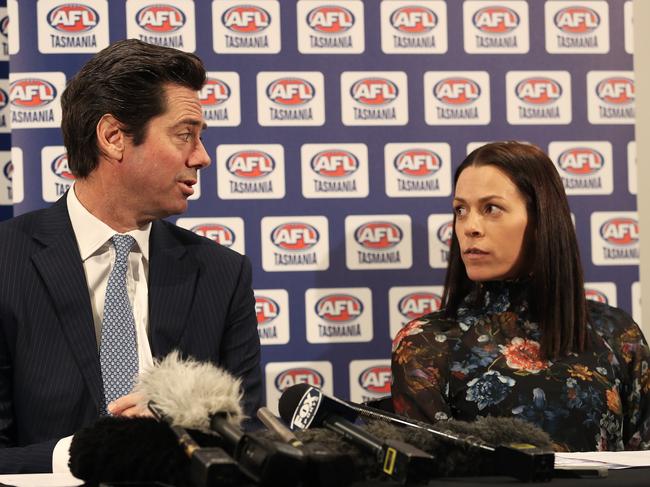
It is Squires’ third CEO role in a career with deep roots and entwining strands in Australian Football, charitable foundations and community work. The seeds were sown for young Trisha Silvers as a struggling teenager who dropped out of high school but found her way to the first program run by the Reach Foundation, a youth organisation co-founded by Stynes that has gone on to become a leading light and offer salvation to many young people by providing a different environment in which to flourish.
In a satisfying full circle, Squires returned to the foundation in 2015 as its chief executive, her second leadership role following a stint at the St Kilda Youth Service. Her work in the footy world began at 17, when Stynes arranged a sports administration traineeship for her at Melbourne Football Club. She also returned to formal education to get her VCE, then a bachelor of arts degree.
Her life took a devastating turn eight days into her marriage when Troy Broadbridge died with at least 230,000 others in the tsunami. By turns despairing, desperate and extraordinarily focused in the first year after his death, Squires channelled her grief and energy into building an education centre on tsunami-ravaged Phi Phi island and starting a masters degree in international development.
She was named Young Australian of the Year for 2006, honouring her humanitarian work both in Thailand and with Australian youth. She also wrote a memoir, Beyond the Wave, which pivoted on her experience of the terrifying natural disaster that surged from the Indian Ocean.
While Squires doesn’t want others to define her by that period, she knows it changed her forever. “When you have experienced tragedy, you look at things quite differently,” she says. “So when I look at challenges, I am not afraid. If things are going to get hard they don’t feel as hard as they probably would [otherwise]… Something would have to be really big for me to get rattled by it because I think I just have a strength.”
She is drawing on her mettle now. Her role at AFL Tas is not for the fainthearted. It will take skill and strength not to fumble a ball that commentators say has been fumbled all too often in Tasmania over the past two decades. As someone wrote on one of several lively footy forums, “Trish could be the best thing since inflatable tyres and she could still fail due to the impoverished dung heap she has inherited.”
It will take stamina and resilience to keep her eye on the prize in this age of discontent. She knows fans’ patience is being tested. “[But] the only way we can make a difference in Tassie is if we all work together, and that’s going to take time to build relationships and trust,” she says.
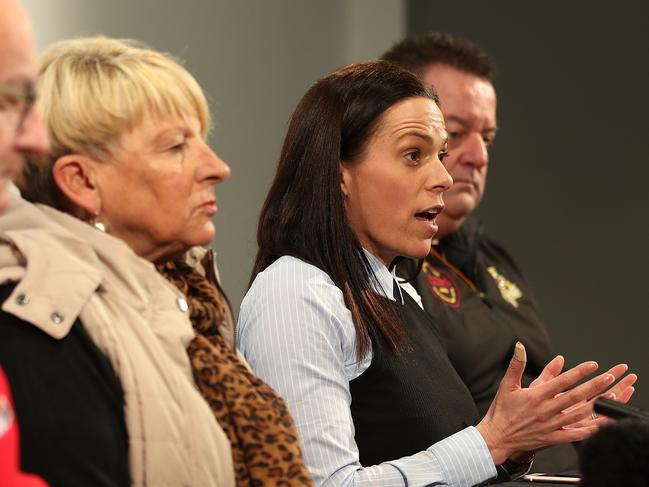
Your mad-keen footy fan can be a tough customer. In turn, some say the same of Squires. She put noses out of joint early on when her formal demeanour had her branded aloof in meeting rooms where jokey, blokey rapport is the historical norm. And she is seen by some as exacerbating the AFL House trust deficit with even simple gestures such as nodding a lot when her boss, AFL national head Gillon McLachlan, addresses the press here.
This is a woman under the microscope at an intensity one cannot say for sure, but can only hope, a man would also be.
There have been more serious contentions, too. Early on, Nine Network Footy Classified analyst Caroline Wilson questioned Squires’ readiness for the leadership role. Her sharp-shooting segments are dubbed Caro’s Arrow for a reason, and her missives have been seized on and amplified by game insiders and sideliners wary of criticising Squires’ appointment outright, lest it be construed as sexist.
While many judged Wilson’s appraisal on target and her well-paid subject fair game, others have been blunter, calling Squires a puppet or plant here to do the bidding of AFL House rather than serve Tasmanian football.
An astute assessment of issues facing the game in Tasmania was delivered in a 2016 AFL-commissioned Future Directions report by former AFL player and Western Bulldogs chief executive Simon Garlick. He noted, though, that the footy community, with 70,000 players and other participants, was still “by far and away the largest social institution in Tasmania, maintaining a significant amount of reach and influence within the community”.
Late last year sports journalist and author Martin Flanagan highlighted the depth of Tasmania’s love for and connection with the code, describing it as a world-class game played by a tiny fraction of the world’s population. ”It has only ever flourished in a few places, one of which is Tasmania,” he said.
Just as there is community consensus that footy can’t thrive without healthy grassroots, there is a firm belief we will be properly recognised only when we get a men’s team in the national competition.
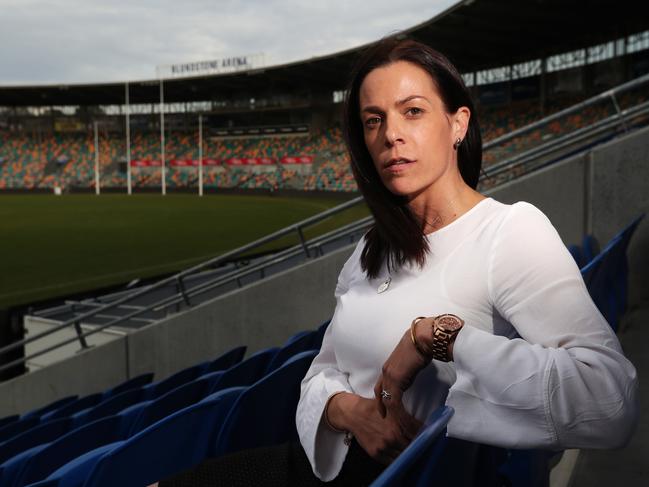
Before her arrival, Squires had heard about the state’s passion for the game it has played for more than 150 years but says the fervour still took her by surprise. “I understand the angst [about not being in the national comp] because I can see there’s a rich, proud history of football here, and that’s something I wasn’t aware of before I moved to Tasmania.”
Squires is about a year into her job when we meet in her glass-cubicle office at Blundstone Arena in Bellerive. The interview takes place on a pair of red footy-leather lounges plastered with the ball maker’s logo. Vogue Living it ain’t. We have a laugh about the loud lounges, which she assures me came with the job and were not of her choosing. “Apparently across the country they are in all the offices,” she says.
Seldom, I suspect, will Squires have been interviewed by someone who knows as little as I do about the game and its behind-the-scenes machinations. I’ve gleaned most of it in the five hours before our lunchtime encounter, including consulting with Mercury sports editor Brett Stubbs.
As we position ourselves, I warn Squires I’m on a steep learning curve and reassure her it will continue in the following days before I come to write.
Then I leap in, asking her how it felt to start her new job on the day Burnie announced it would follow Devonport by leaving the TSL competition. Many viewed the double-whammy loss in the traditional North West heartland as an ominous portent for the troubled league, already weakened by chronic underfunding and other issues. It also threw the broader competition in jeopardy, leaving only seven teams to compete.
Squires says that, having already worked for AFL Tasmania, she was across the issues and knew losing Burnie was a chance. Nevertheless, she agrees “it wasn’t ideal it happened on my first day in the job”.
“Certainly the first football season was a tough challenge, certainly I would hope it wouldn’t be repeated again,” she says when I say the job sounds a bit like a poisoned chalice. “I didn’t feel I was handed a bad situation. That was just where football was in Tasmania and I believed I was the right person for the job. While it would have been preferable the first season would go along quite smoothly, that didn’t happen for me, and I think it actually gives me more of a chance to make an impact because we have started from a point the media described as a football crisis and we have a real chance to turn it around.”
Squires nominates her role in brokering extra funding from the AFL and spotlighting the plight of Tasmanian football as her proudest first-year achievements — though the Mercury would argue that last year’s Tasmanian Football Steering Committee would not even have formed without the sustained pressure of our newspaper’s Save our Footy campaign and cheeky front-page ribbing of McLachlan.
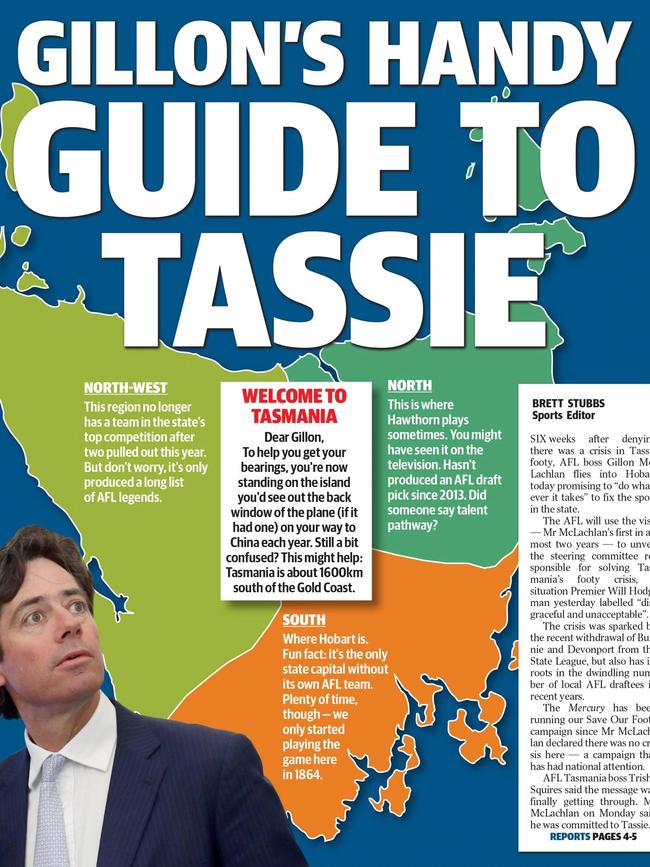
“From the steering committee outcomes we got an extra $1.4 million to Tasmanian football, which is a significant uplift,” says Squires. Indeed, it about doubles the previous annual fund. From a drawer, Squires produces a glossy eight-page brochure detailing the steering committee’s findings last June. It was chaired by McLachlan and also included Squires’ predecessor Robert Auld (now back in Melbourne as head of game development), former Tasmanian and St Kilda great Nick Riewoldt, Carlton and Brisbane coaches Brendon Bolton and Chris Fagan (both ex-Tassie, too) and four AFL national administrators. While convenors were slammed for not including a single local administrator or coach in its ranks, the committee’s outcomes have been broadly accepted. And a new Football Tasmania State Government Advistory Board announced on Wednesday, on which Squires will also sit, captures a wider range of voices.
The steering committee’s overarching vision, which builds on groundwork laid in the Garlick Report, is to grow the participation base — by 10 per cent a year, says Squires. Deeper pathways are to be carved for youth and senior talent to be drafted to the AFL/AFLW. There’s also a VFL representative program in the works for the men’s game, with a prospective 2021 start date.
Raising participation and engagement rates at the highest state level, the TSL, is a priority. About $450,000 of the extra money will be spent on community football initiatives. These include establishing regional competition hubs and a budget to pay staff to help run them, lightening the load on volunteers. A drive is also under way to rebuild the game’s popularity with children through Auskick and schools programs.
An Under-18 boys’ competition for elite talent is launching this year – the TAC Cup will be played in Victoria, with an equivalent girls’ comp to follow in 2020. Some funding will help develop female talent pathways, including the emerging AFLW North Melbourne Tasmanian Kangaroos, who trounced Carlton in an historic game played on the North Hobart Oval on February 3. With eight Tasmanian women already on the list of about 30 players, Squires believes a 50 per cent goal is achievable.
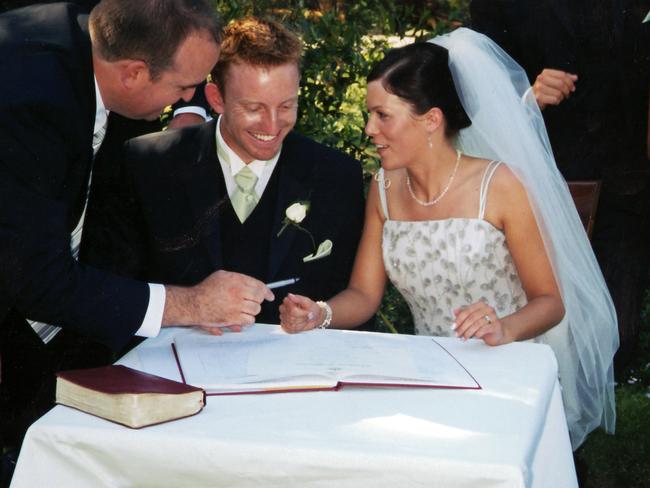
After a 15-year drop-off, overall participation rates have crept back up in the past few years. Growth in girls’ and women’s divisions, though, masks a worrying fall among boys and men in the state. “The ages of 14-15 is where there is a gap,” says Squires. Competing priorities and distractions may be mostly to blame, she says, but the best way to minimise the chance of more such holes developing is to introduce football to children early.
“Unless they are engaged from a young age, we have found it’s really hard to bring people into football in the youth age group. You need a lot of skills to play and if it’s something you start as a young child, handling a football, handballing, kicking, it’s something you tend to continue. So it’s at that base level we need to do the work to continue that pipeline.”
When I ask Squires about her role in advocating for a much-longed for Tassie-origin men’s AFL team, she seems tense. Apparently she doesn’t have one, strictly speaking, though she is all for it. “I think sometimes there’s been questions about how we get an AFL men’s team. Obviously I would love to be the person that gets us a licence, but unfortunately that wouldn’t be one of my KPIs as part of my job,” she says.
Over the next 10 minutes or so, we go back and forth as I try to get a better handle on some of the intricacies of the challenges facing Tasmanian football, who funds what and the public sentiment churning around it all. Each year the state sponsors AFL teams Hawthorn and North Melbourne, who will this year each play four games in Tasmania. While the deal has flow-on economic benefits to the state, I ask if she thinks an opportunity has been missed to siphon some game revenue back to state and community levels, say through ticket sales.
“There does seem to be increasing criticism of the North Melbourne and Hawthorn deals,” I venture, and in turn that makes me wonder if growing discontent over Tasmanians’ perceived poor treatment from the AFL nationally is making her job of reigniting passion for the game at all levels more difficult. Dissatisfaction seems to peak, I add, when conversation turns to the millions being poured into supporting the game in virgin territories such as the Gold Coast while Tasmania, a traditional home of the game, is kept on a near-starvation diet.
Squires says she is “not too sure what my question is”. In fact, she is “not really sure where any of this is going, to be honest, like, maybe there is a misunderstanding of knowledge on the football side”.
Like, duh! She says she wants to wrap the interview up now “if that’s OK”. Having already declared my zero-footy cred, I explain I have come with an open mind and without a predetermined outcome other than in the broadest terms.
“The questions are not making any sense,” she says, and makes as if to stand in her high black pumps, perhaps with a little brush of her narrow skirt.
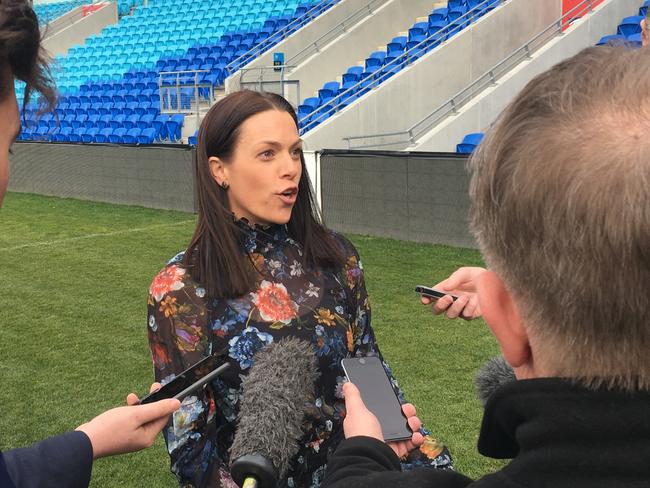
I sit tight on the red leather and throw to what I hope is an easier topic, perhaps even her favourite one. “I’d love to talk about you being a woman in football,” I say. It works.
As the mother of two young girls, Harper and Holly, Squires says she is proud of her role as a change-maker in becoming the first woman in the country to hold a state AFL chief executive role. “For me it was more what it means for my daughters than anything else,” she says. “It wasn’t something I was trying to do, to become the first female CEO, but I am — but I suppose it’s something for them to grow up and know their mum can be a boss and that’s pretty normal.”
I ask if she has felt the bite of gender resistance in the job. “I think there’s obviously been people who’ve said ‘why is a woman running football?’ People have said it to me and I’ve read it online, but that’s something I had to be willing to hear, and be strong enough to know that it’s nothing to do with my gender and it has to do with my capability. I think if I can do a really good job here, and it doesn’t matter if I am a man or woman, I can still run football, I think that will be a real positive.”
She knows her personal style is different to that of many of her predecessors, but that doesn’t make it wrong. “I think if you met me in any environment, I am not really loud,” she says. “I am not necessarily a person who will walk into the room and be a larrikin, but I am strong in what I think. My leadership is definitely not about being the centre of attention. There is no ego around it. I couldn’t care what my job title is, it’s about what I’m doing and the difference I’m making.
“Some people do it by corralling people and being loud. My style is to do a really good job and then people will respect me through that. Something I bring different to this role is that I am willing to listen and to collaborate quite a bit. But I also know there are times to make decisions and I am a person who feels comfortable to make those decisions and back myself.”
She sees a strong overlap with Footy Tas’s community charter and that of her previous employers at not-for-profits. “What we do here at footy in schools and junior level is very similar to Reach, which also ran programs in schools and the community.”
Likewise, she says, Reach’s training program – many participants go through an academy to become crew themselves – has resonances in footy pathways. “Again, it’s really similar to the talented young people who come through football who then potentially go on to play AFL and AFLW.”
Politically, it is familiar territory, too, “because your relationships are with government, sponsors, very similar to that of running charities.”
Squires says she is content with the level of networking she has achieved in her first year. “I build relationships with people in a different way,” she says. ”I don’t drink alcohol at all and I think back in the day for a lot of business people that’s how you did deals.”
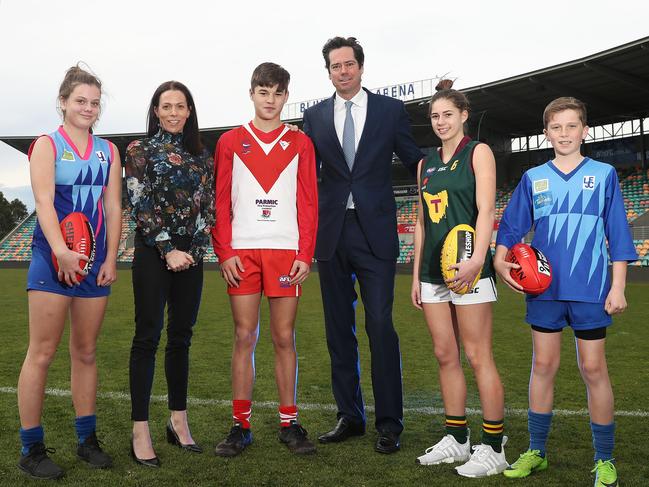
She stopped drinking when she became pregnant with Harper, who was born in 2015. “When I stopped drinking I thought that it just gives you an edge that people don’t necessarily have, in that I’m really healthy and I sleep better. I’m a high achiever so I just thought [regarding] alcohol I can be really clear-minded all the time and make good decisions. I think alcohol can also impact your emotions and I thought that’s not what I really need right now.”
Though they didn’t drink excessively before, she and her husband Jake, who is from Tasmania, simply prefer the way they feel grog-free. Keeping fit is a priority for the couple, who train every day, including in a home gym in the double garage of their home, which is close to Squires’ workplace.
“We like to exercise and we take that really seriously. We are very structured and routine, we eat really well [with Jake doing all the cooking] and that’s how we get the most out of life. I certainly couldn’t do this job and do all the things I do without being [so] structured.”
She met Jake about five years ago after spending years single, following a brief relationship with TV host Ryan Phelan. “All I did [in that decade] was work and try to make a difference,” she says. “I was pretty focused.”
She had only recently scored her first CEO role, at the St Kilda Youth Service, when she met Jake and married him in 2015. “My whole world changed because I had fallen in love and now wanted to have a family. It was a stereotypical thing, to be this career woman and not have kids, but now I’ve managed to do both, which is great.”
Moving to Tassie, the couple launched and ran a Sandy Bay cafe, since sold and now called Giddy Up Foodstore, before she started at AFL Tas. She says she is managing her work/life balance well, and encourages staff (she has five direct reports) to do the same. “I think I get judged, too, because I have a really young family and I’ve got this job here, but I find a way to balance it,” she says . ”I run a really flexible workplace here at AFL Tas. I work one day from home and I’m really flexible because my staff should be happy and spend time with their families and then they will do a really good job while they are here.”
She has held this line even in the wake of stinging criticism from Wilson after she staggered her return to work after giving birth to Holly, now aged 2. She was back at work four days a week by the time the baby was eight months old. Squires wept on her home-gym rower early one morning after watching the previous evening’s segment on her phone.
“I don’t necessarily think whether you work part-time, fulltime or casual doesn’t mean you are not right for a job or not skilled. I don’t think that should matter. But that was really difficult for me, because there was then this perception out there… “ she says. “I was just crying and thinking ‘I don’t know if I can do this’. And I’ll never forget that moment, because in that moment you go ‘can I get up, can I get my girls dressed and face into this one more time?’ And I was like, ‘you can do this, all you need to do is get through today’. Once I got through that day, I have never looked back.”
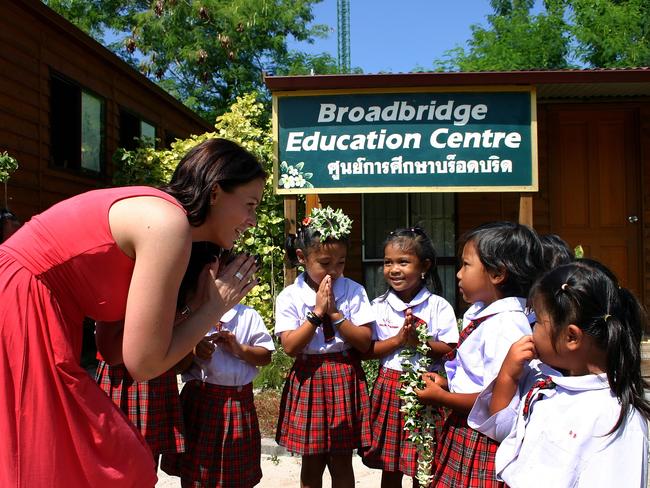
As ever, words of wisdom from mentor Stynes, who died of cancer in 2012 aged 45, gave her strength. “I had a lot of conversations with him in those last days, where he had regrets in life and I learnt a lot from that. For so many years I was trying to be exactly like him … and he said ‘you don’t want to do things just for money or status, all it’s going to be is how you feel about yourself and how the people around you feel about you. And no matter how ambitious you are, you have to spend time with your family. [Your career] can’t be to the detriment of your family’ and I am really strong about that.”
She says she is well aware that many people don’t trust the organisation she runs .“They don’t trust AFL Tasmania and they don’t trust the AFL because there is this perception there should be an AFL men’s team. I will fight to try to get an AFL men’s team, but I am not going to do that while I need to be making sure Tassie footy is healthy.”
For Squires, that means consolidating it from grassroots up so that if/when another national licence comes up, Tassie is robustly ready.
Squires says she’s here to stay, too. “I’d like to still be in the job in five years ... I am planning to live in Tasmania and bring up my family here.”
As I transcribe my recording of our interview the next day, I am faintly dreading the moment when I’ll have to listen to my alleged bamboozling question fail. Upon hearing it though, it’s her response not my question that confounds. Squires, meanwhile, rings my editor to complain about the interview. She wasn’t prepared for this focus and was concerned it could lead to another negative football story. She had assumed it would be centred on her as a person, rather than the issues facing the game — whatever that means when you are the boss of a code in crisis in your state.
As I reread the transcript, I wonder if Squires’ frequent allusions to her strength and abilities comes from feeling she must constantly justify her position. And, if so, how much of it is about gender, one way or another. Or a legacy of the girding self-talk and ‘living your dreams’ affirmations that are often prominent in the mindset of organisations such as Reach. Or something else.
There’s no definitive answer. It’s just food for thought at a defining time in footy for women — and a crucial time in the game’s long life in Tasmania.
So, show ’em your might, Trisha Squires, but remember that though the song is old, the playbook has not changed. You still need the crowd on your side. Up there, Cazaly!


